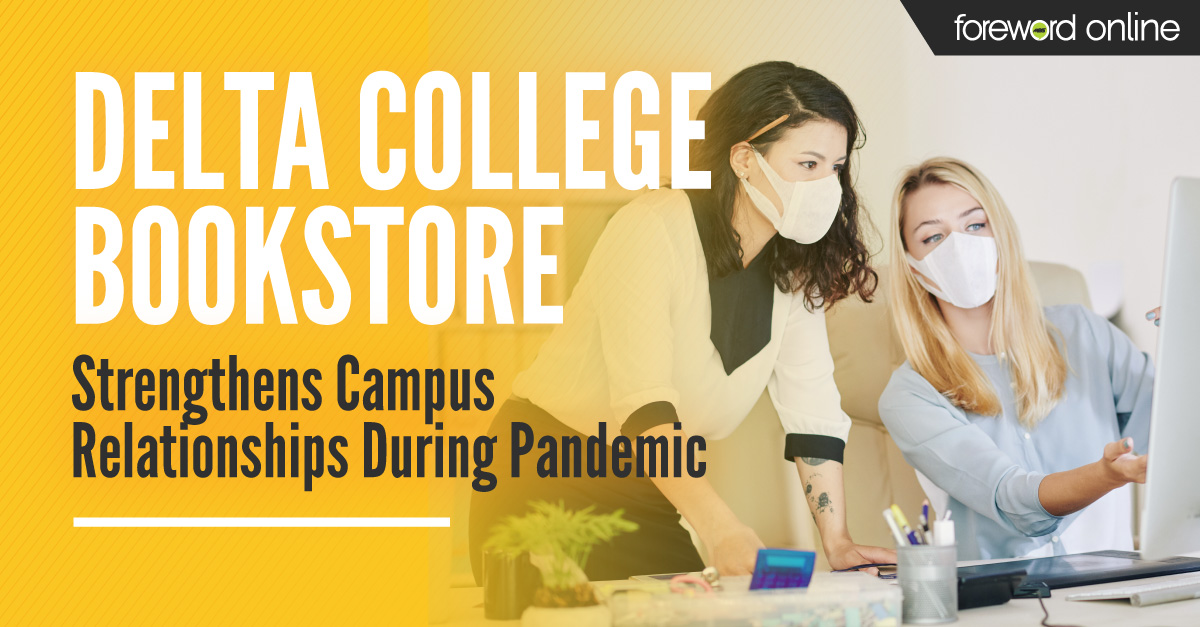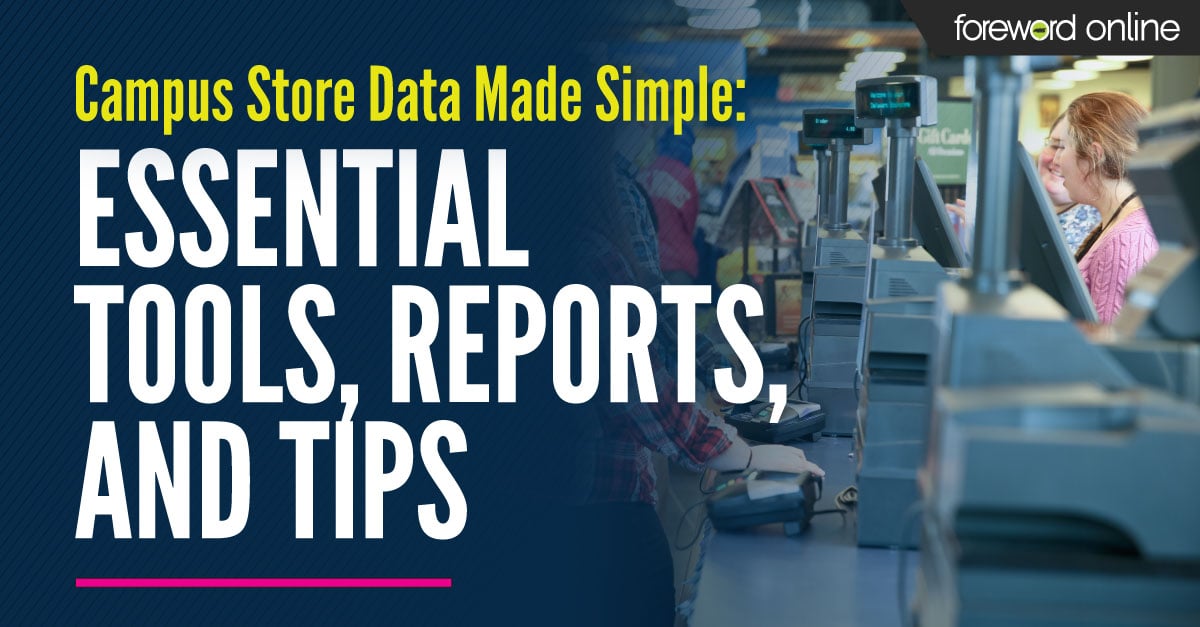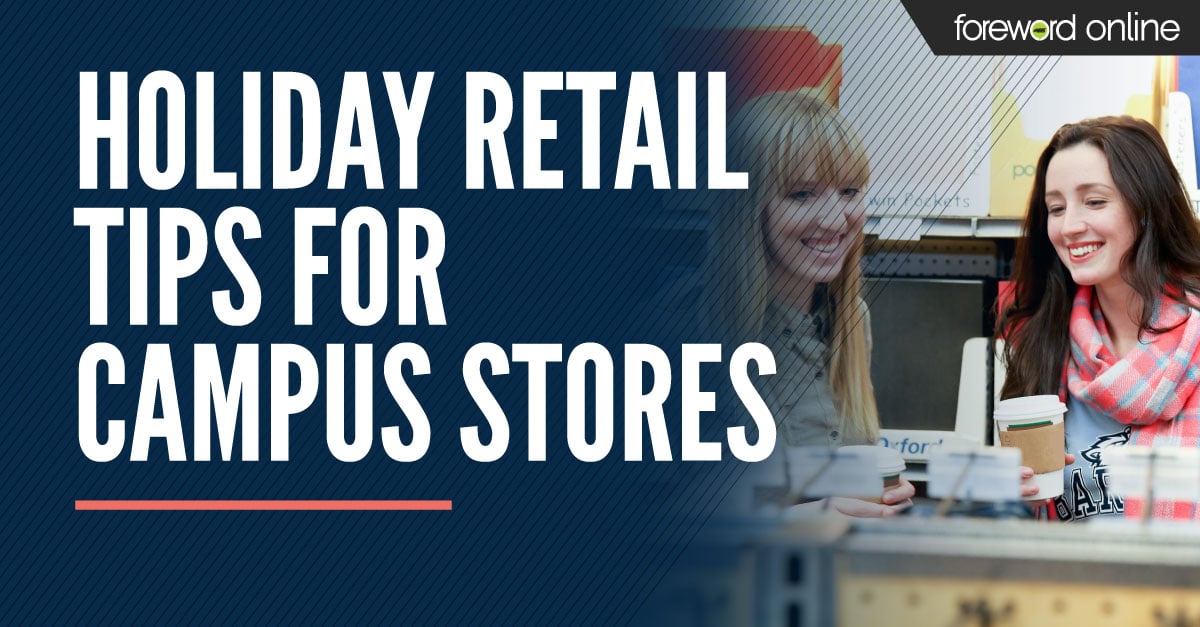Since the end of March, college stores have had to make quick adjustments to meet the unprecedented demands created by COVID-19. As the San Joaquin Delta College campus responded to the pandemic, the Delta College Bookstore stepped up with a plan to safely offer students a centralized location to return and pick up materials.
 “When all of this started, the question was, how do we get our students the technology they need? Our campus was purchasing laptops and our IT department was configuring the laptops, but they didn’t have the personnel to also hand them out. However, that was definitely something the bookstore could help with. So, we started there. In auxiliary services, we have access to an old cottage on campus that has service windows much like you would see in a concession stand. We started working with different programs on campus to identify students who needed laptops, hotspots, and/or Chromebooks. Our staff was able to go into the cottage and hand out the devices to students,” Michael Williams, Auxiliary Services Operations Supervisor, said. “We were masked up, gloved up, had hand sanitizer inside for staff and outside for students, and portable hand washing stations on the outside of the building for the students to use. We became the “go-to” location for students who needed technology.”
“When all of this started, the question was, how do we get our students the technology they need? Our campus was purchasing laptops and our IT department was configuring the laptops, but they didn’t have the personnel to also hand them out. However, that was definitely something the bookstore could help with. So, we started there. In auxiliary services, we have access to an old cottage on campus that has service windows much like you would see in a concession stand. We started working with different programs on campus to identify students who needed laptops, hotspots, and/or Chromebooks. Our staff was able to go into the cottage and hand out the devices to students,” Michael Williams, Auxiliary Services Operations Supervisor, said. “We were masked up, gloved up, had hand sanitizer inside for staff and outside for students, and portable hand washing stations on the outside of the building for the students to use. We became the “go-to” location for students who needed technology.”
By utilizing a different facility, the store could offer students better service and build stronger relationships with various departments and programs on campus.
“The reason we chose to operate out of a different facility was not only because of the concession stand windows, but it was also in a very convenient location on campus. Students could pull right up in front of the building, walk 20 to 30 feet, grab the device they needed and then return to their car,” Williams said. “There was never a line of students. There never was an issue. My staff took one week to gather what we needed, and the school took some time to collect devices. By the second week of the pandemic, we were a laptop distribution team.”
This service the bookstore was providing to students and campus didn’t stop there. They have continued to foster relationships and offer distribution services to departments and programs on campus.
“Our science department is purchasing 500 skeletons so students taking anatomy online will have access to their own set of bones. We will be a distribution point for that as well. If there is an item that is to be collected or passed out, students come to us. We’re one team helping the entire campus community. It helps limit exposure on campus and conserves PPE resources. The bookstore team has been trained on how to use the PPE equipment, and we have adequate amounts to ensure our safety and student safety,” Williams said.
Reopening the bookstore
The store continued to use the cottage until June 1. At that date, California started reopening and allowed retail stores to offer curbside pickup. They moved back to the bookstore to better serve students looking to purchase summer textbooks.
“We knew it would be very complicated for us to continue to operate out of the cottage and handle textbook distribution. The cottage was on the opposite side of campus. We couldn’t really go back and forth to the store; it is quite a distance to travel. In the bookstore, we have two sets of double doors. We leave both sets wide open. We put rolling cash wraps in front of the doors and added plexiglass to them. We have been serving students right from the front doors of the bookstore,” Williams said. “We offer different ways to serve our students. We run a website that students have been encouraged from day one to place their orders and have them shipped to their homes. We also work with several campus programs that help students. Many times, these programs aren’t able to provide free shipping and maybe students can’t afford to pay shipping costs. So, we turned back on the curbside or in-store pickup options,” Williams said. “Another issue is that some students don’t have a device and can’t place their order online. At the end of the spring term, a lot of devices were returned, and now we have incoming freshmen. Those freshmen don’t currently have devices, so we get a lot of students who still walk up to order their textbooks. When a student walks up we write down all the books they need and ask them to go to a central area of campus about fifty feet from the front of the bookstore to wait in the open area where they can maintain social distancing. We give them a time to come back and we have their books ready and waiting for them. This helps prevent any gatherings in front of the store.”
Streamlining student financial aid usage for online orders
With a significant portion of students on campus receiving financial aid or some sort of assistance, the store must also be able to accommodate various voucher payment methods. Delta College Bookstore worked with MBS to ensure their students could use their voucher for online for purchases.
“About 80 percent of the students on our campus receive financial aid or assistance with their books. We had to evaluate how we continue to operate our business and serve students that are receiving vouchers. We worked with MBS to add that form of payment on our website. A student can pay with a credit card or now they can pay with a voucher. When they pay with a voucher, they simply use their student ID number and note which program they are part of,” Williams said. “All the programs on campus, such as student financial aid, veterans, or foster youth, share their recipient spreadsheets with us on Microsoft Teams. The spread sheet tells us which students have an approved voucher, their student ID number and the amount they are approved for. Let’s say Michael Williams was approved for a textbook voucher worth $250. Michael Williams then goes on the website and places the order. He enters his student ID number, and in the footnote, he declares the program the voucher is for. For example, he can say, ‘I have a financial aid voucher.’ When the bookstore team gets the order through inSite, they can go to the spreadsheet for financial aid and find Michael Williams. If it is under the $250, we process it and the order is ready for him to pick up. If it goes over the amount, we will gather all the items, but when Michael Williams comes to the store, he’ll have to pay the difference between the voucher and the price of the books. It’s a really quick credit card transaction and off the student goes. Adding the voucher payment option to the website has reduced the wait time and the number of students who couldn’t place an order online because they had a voucher.”
In the midst of so much change, the bookstore has even been able to begin selling computers again.
“We were asked to make the same laptops and Chromebooks the school was handing out available for sale for those who receive financial aid. So, we worked with our financial aid department and our IT department to provide devices for sale on our website. Financial aid has increased textbook vouchers from $750 to $1,000 to allow students to buy a device,” Williams said. “What’s nice about that is we sell the same devices our school uses as loaners, so our IT department put together a student helpdesk operated by students. They will troubleshoot or help anybody who purchases a laptop through the bookstore. All they have to do is contact the Mustang Tech Team. One of the reasons we shied away from selling devices is the fact that you need internal experts who can help students troubleshoot. The fact that our IT department has agreed to help with support, we can provide a more complete student service. Also, we are able to buy along with the campus, so we are getting the bulk volume price that the campus is getting. It’s just been a fantastic partnership from the very beginning.”
Delta College Bookstore keeps their website up to date
As the fall term approaches, the Delta College Bookstore knows how important it is to make sure their website offers students everything they can get in the store.
“Our website through inSite is a fantastic avenue. We had a lot of our merchandise online prior to all of this. We had all of our apparel, calculators and logoed merchandise on the site. What we didn’t have prior to the pandemic was a lot of the school supplies, art, engineering and photography supplies. We have gone back to our website and really ensured that we have a full representation of everything we carry. Essentially, if it is not edible, it is on our site,” Williams said. “We have gone through every ruler, stapler, pen/pencil set, etc. All the supplies were added in the very early weeks of the pandemic. So now for our summer term, students are starting to see that along with textbooks and binders they can add any other necessary supply to their purchases.
“We are also working with the drama department for fall. The drama department teaches costume makeup, so we will facilitate students buying their costume makeup through our website. It’s really odd that it took a pandemic, but it is really strengthening our on-campus relationship with a lot of departments,” Williams said. "A lot of faculty members are starting to look at us as a service to our students. They recognize that we are here to help. All they have to do is ask and we will say yes. Students are getting their materials and better service because we are here on campus to help.”
As more stores look to reopen, Mr. Williams offers some advice to help ensure your store remain an essential campus service.
“I would say communication with your campus community and executive team is the most important thing you can do. Make sure you understand what your local and state requirements are and write out a plan to meet and exceed those requirements,” Williams said. “Show your campus community, your faculty, your executive team and to some extent even your board that you can meet those expectations if you are allowed to reopen.”





